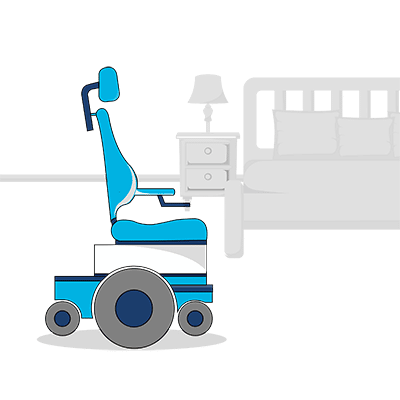Despite the fact that 205,200 adults in Australia are autistic and many are willing and able to work, people with autism struggle to find employment and thrive at work. This World Autism Awareness Day – on 2 April – we’re putting the spotlight on autism in the workplace.
Autistic people are hard-working, loyal and bring unique creative thinking and problem solving skills to their employment. However, working in a rigid structure designed with neurotypical people in mind can be confusing and mentally exhausting.
This article covers some of the key challenges that autistic workers face, as well as advice on how to deal with them.
In this article
Autism in the workplace
Sensory overwhelm, unclear social cues and constant change are some of the struggles autistic employees deal with. World Autism Awareness Day is an opportunity to better identify these struggles and find ways to cope.
In Australia, the unemployment rate for individuals with autism is 31.6%, which is three times the rate of people with disabilities in general and almost six times the rate of people without disabilities. This is despite the fact that most autistic people are keen to work and bring unique skills to their employment.
Some places of work are inflexible and it may be challenging to adapt to them when you have autism. Nevertheless, there are some strategies you can adopt to make your working life slightly less stressful. Here they are below.
1. Sensory sensitivities to manage when you have autism
Managing autism in the workplace can be daunting for those who have sensitivity to light or sound. This can make the typical office environments uncomfortable or overwhelming.
Here are strategies to makes things more bearable:
- Request accommodations, such as noise-cancelling headphones, a desk away from high-traffic areas, or permission to use dimmer lights.
- Take regular breaks in a quiet space to recharge.
- Don’t underestimate the mental boost of creating a workspace that feels like a home away from home. Ensure it’s sensory-friendly and personalise your environment with items that help bring down your stress or sensory overload. This could include adding ergonomic furniture to make you more physically comfortable, plants to improve air quality and bring a calming element to the space, and a desktop fountain or white noise machine for soothing background sounds. Personalising your space creates a ‘safe zone’ where you feel comfortable and able to focus.
2. Autism and social communication in the workplace
When it comes to autism in the workplace, you may have difficulties with social cues, small talk, or understanding non-verbal communication. This can make team interactions challenging.
The below can help:
- You don’t need to tell your colleagues that you’re living with autism in you don’t want to. However, it may be helpful to explain your communication style to co-workers and supervisors to help them understand your needs better. For instance, if you have trouble understanding the tone of an email, you can request that any feedback you’re given is done face-to-face.
- Practicing social scenarios or role-playing with a therapist or a trusted friend can hugely improve your social communication skills and confidence. Do it regularly, especially ahead of stressful work events or tasks that you’re finding challenging.

3. An autistic lens on adapting to workplace change
Changes in routine or unexpected tasks can be particularly jarring or disorienting when you have autism. Change is unavoidable, but there are ways to minimise the stress:
- Develop a schedule where you build in time for transitions or unexpected tasks.
- Gradually exposing yourself to small changes can also help increase your adaptability over time. This could include varying your daily routine slightly, such as changing your work start time by a few minutes, trying a new food or beverage during your break, rearranging your workspace, or taking a different route to work. These minor adjustments can help you become more comfortable with change over time, building resilience and flexibility.
4. Executive functioning in the workplace with autism
Organising tasks, managing time, and prioritising work can be difficult when you have autism. Remember that it’s key to externalise information and use tools to help you:
- Use tools and apps designed for task management, like digital calendars, timers, and to-do lists.
- Break down large tasks into smaller, manageable steps and set deadlines for each step.
- Use visual aids like planners or digital task management apps.
- Set clear, achievable daily or weekly goals.
- Use timers or alarms for effective time management.
- Prioritise tasks by urgency and importance.
- Allow flexibility in your schedule for changes or sensory breaks.

5. Advocating for yourself as someone living with autism
It might be challenging to communicate your needs or seek accommodations. The key is to be specific. For instance, instead of saying the workplace is giving you sensory overload, think of what could be changed to help.
For example, “Loud environments disrupt my focus; could I use noise-cancelling headphones or be seated in a quieter area?” This approach clarifies your needs and makes it easier for others to provide the appropriate support or accommodations.
Organisations like Autism Spectrum Australia (Aspect) offer resources and advice for adults with autism, including workplace support.
Consider working with a job coach or therapist who can help you develop strategies for self-advocacy. If possible, find professional networks for people with autism or disabilities for support, mentorship, and advice on navigating workplace challenges. There’s a lot of shared knowledge that can help you better advocate for yourself.
You should also give our ‘A Guide to Disability in the Workplace‘ article a read. You might also find interesting our ‘Entrepreneurs with Disabilities: How to Become One‘ blog post.
Finding supportive environments
Despite these strategies, you may still struggle in your place of work. If the environment is hostile and it’s affecting your mental health, it may be time to look elsewhere.
Wherever possible, look for employers that show commitment to supporting diversity and inclusion. One good idea is to approach an organisation dedicated to placing workers who live with autism.
Consider jobs that match your interests and strengths, especially those that might leverage your attention to detail, deep focus, or expertise in a particular area. This World Autism Awareness Day and beyond, remember that autism in the workplace is a unique strength that you bring and can benefit the business with.

Insurance for your independence
At Blue Badge Insurance, we work with a broad range of people living with disabilities every day, because we insure mobility equipment and vehicles. We understand that there’s no single way for everyone to be, and we value that.
That’s also why, not only do we provide wheelchair, mobility scooter insurance and disability car insurance but we also provide Assistance Dog insurance. We know that autism Assistance Dogs can help support those who need them. But that even these dogs sometimes need an unexpected trip to the vet.
Because we understand how costly unexpected vet bills can be, we offer up to 25% off Assistance Dogs insurance and up to 15% off pet insurance! Unlike human health care, vet bills aren’t government subsidised. Pet insurance can help pay vet bills for all kinds of unexpected visits for illnesses, injuries and more.
Click below to get a quote for any of these.








